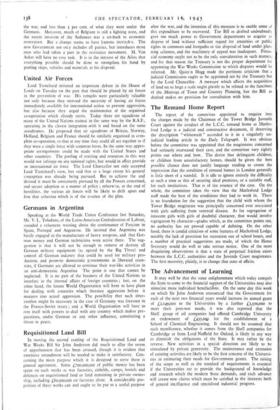Requisitioned Land Bill
In moving the second reading of the Requisitioned Land and War Works Bill Sir John Anderson did much to allay the storm of apprehension that has been aroused, though it is evident that extensive amendment will be needed to make it satisfactory. Con- cerning the main purpose which it is designed to serve there is general agreement. Some £700,000,000 of public money has been spent on such works as war factories, airfields, camps, hostels and defences on requisitioned land or land remaining in private owner- ship, including £6o,000,000 on factories alone. A considerable pro- portion of these works can and ought to be put to a useful purpose
after the war, and the intention of this measure is to enable some of this expenditure to be recovered. Tice Bill as drafted undoubtedly gave too much power to Government departments to acquire or dispose of land without sufficient regard for amenities or public rights in commons and footpaths or the disposal of land under plan- ning schemes, and the machinery of appeal was inadequate. Finan- cial economy ought not to be the only consideration in such matters, and for that reason the Treasury is not the proper department for appointing the War Works Commission to which disputes would be referred. Mr. Quintn Hogg made the pertinent criticism that a judicial Commission ought to be appointed not by the Treasury but by the Lord Chancellor. A measure which affects the acquisition of land on so large a scale ought plainly to be related to the functions of the .Minister_ of Town and Country Planning, but the Bill as drafted makes no provision for consultation with him.


























 Previous page
Previous page